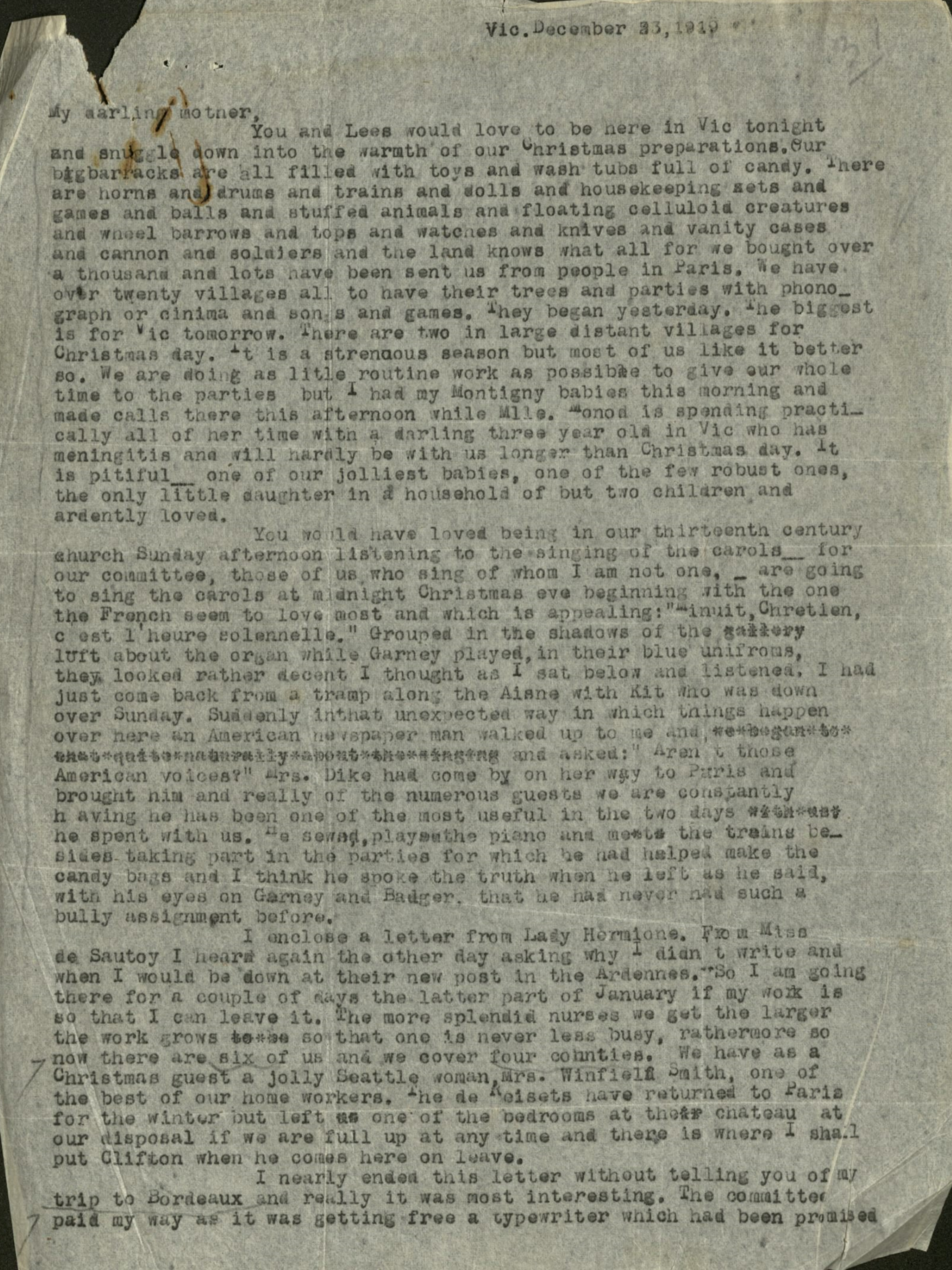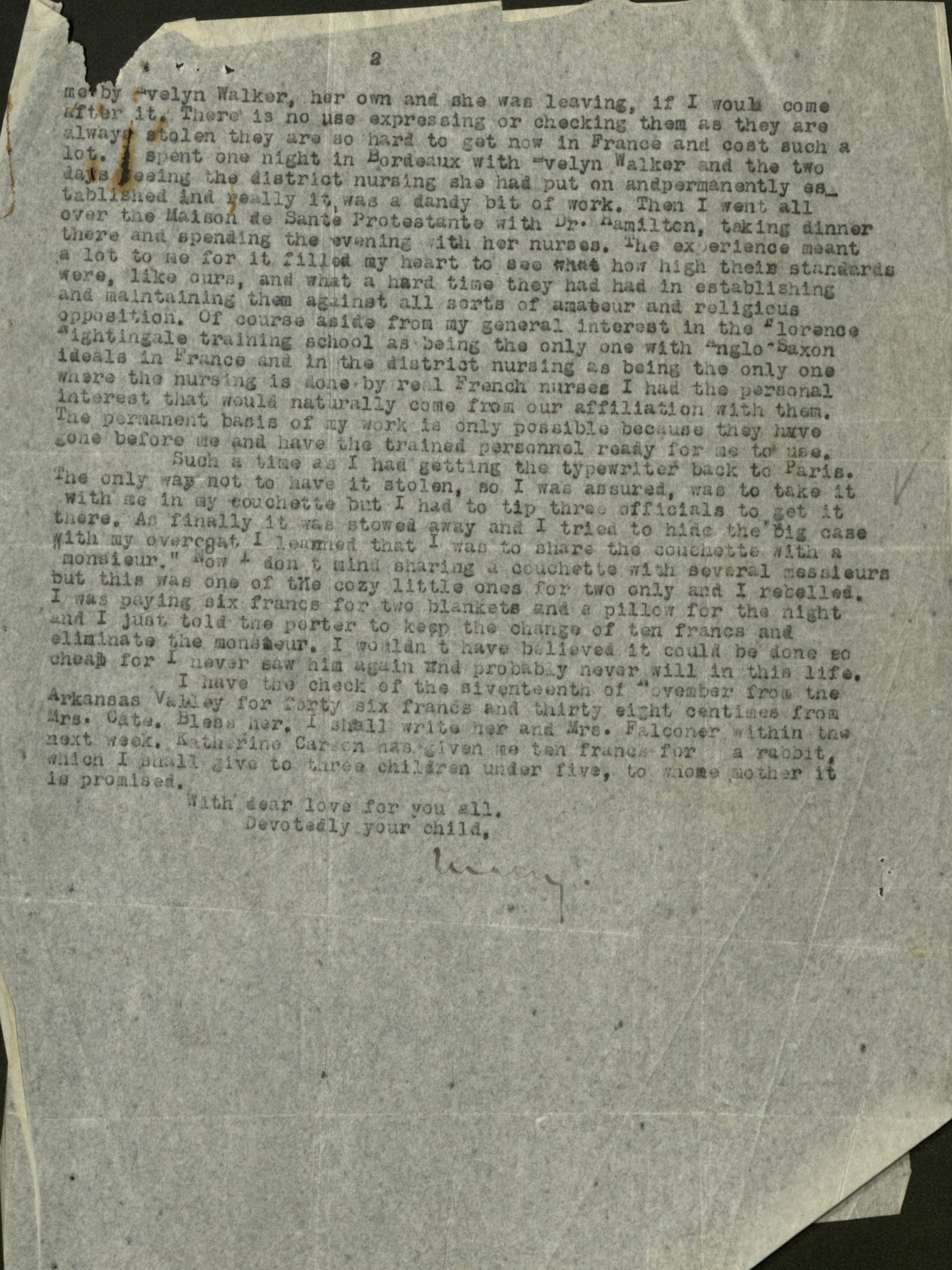To Katherine Breckinridge, 13 December 1919
digitized, transcribed, encoded, and annotated by Elle Kowal
This short letter, written to her mother, is one of the last that Breckenridge wrote in 1919, and ends the year on a rather cheerful note. In the letter, she details preparations for Christmas in France including the toys they have gathered to distribute to the local children and church preparations. She goes on to talk about various guests to Vic, her journey to Bordeaux to acquire a very in-demand typewriter for the Red Cross, and her bribing of a porter on the train ride home. In closing, she briefly discusses the funds received from supporters in the US for her work.
Vic.December 13, 1919
My darling mother,
You and Lees would love to be here in Vic tonight
and snuggle down into the warmth of our Christmas preparations. Our
bgiig barracks are all filled with toys and wash tubs full of candy. There
are horns and drums and trains and dolls and housekeeping sets and
games and balls and stuffed animals and floating celluloid creatures
and wheel barrows and tops and watches and knives and vanity cases
and cannon and soldiers and the land knows what all for we bought over
a thousand and lots have been sent us from people in Paris. We have
over twenty villages all to have their trees and parties with phono_
graph or cinima and songs and games. They began yesterday. The biggest
is for Vic tomorrow. There are two in large distant villages for
Christmas day. It is a strenouuous season but most of us like it better
so. We are doing as litle routine work as possible to give our whole
time to the parties but I had my Montigny babies this morning and
made calls there this afternoon while Mlle. Monod is spending practi_
cally all of her time with a darling three year old in Vic who has
meningitis and will hardly be with us longer than Christmas day. It
is pitiful_ one of our jolliest babies, one of the few robust ones,
the only little daughter in a household of but two children and
ardently loved.
You would have loved being in our thirteenth century
church Sunday afternoon listening to the singing of the carols_ for
our committee, those of us who sing of whom I am not one. _ are going
to sing the carols at midnight Christmas eve beginning with the one
the French seem to love most and which is appealing: Minuit, Chretien,
c'est l'heure solennelle." Grouped in the shadows of the
loft about the organ wile Garney played, in their blue unifromsuniforms,
they looked rather decent I thought as I sat below and listened. I had
just come back from a tramp along the Aisne with Kit who was down
over Sunday. Suddenly in that unexpected way in which things happen
over here an American newspaper man walked up to me and we began to
chat quite naturally about the singing and asked:" Aren't those
American voices?" Mrs. Dike had come by on her wyaay to Paris and
brought him and really of the numerous guests we are constantly
h aving he has been one of the most useful in the two days with us
he spent with us. He sewoeed, playseded the piano and meets the trains be_
sides taking part in the parties for which he had helped make the
candy bags and I think he spoke the truth when he left as he said,
with his eyes on Garney and Badger, that he had never had such a
bully assignment before.
I enclose a letter from Lady Hermione. From Miss
de Sautoy I heard again the other day asking why I didn't write and
when I would be down at their new post in the Ardennes. So I am going
there for a couple of days the latter part of January if my work is
so that I can leave it. The more splendid nurses we get the larger
the work grows to be so that one is never less busy, rathermore so
now there are six of us and we cover four cohntiescohntiescounties. We have as a
Christmas guest a jolly Seattle woman, Mrs. Winfield Smith, one of
the best of our home workers. The de Reisets have returned to Paris
for the winter but left us one of the bedrooms at their chateau at
our disposal if we are full up at any time and there is where I shall
put Clifton when he comes here on leave.
I nearly ended this letter without telling you of my
trip to Bordeaux and really it was most interesting. The committee
paid my way as it was getting free a typewriter which had been promised
2
me by Evelyn Walker, her own and she was leaving, if I would comeafter it. There is no use expressing or checking them as they are
always stolen they are so hard to get now in France and cost such a
lot. I spent one night in Bordeaux with Evelyn Walker and the two
days seeing the district nursing she had put on and permanently es_
tablished ind really it was a dandy bit of work. Then I went all
over the Maison de Sante Protestante with Dr. Hamilton, taking dinner
there and spending the evening with her nurses. The experience meant
a lot to me for it filled my heart to see whathow high theisrr standards
were, like ours, and what a hard time they had had in establishing
and maintaining them against all sorts of amateur and religious
opposition. Of course aside from my general interest in the Florence
Nightingale training school as being the only one with Anglo Saxon
ideals in France and in the district nursing as being the only one
where the nursing is done by real French nurses I had the personal
interest that would naturally come from our affiliation with them.
The permanent basis of my work is only possible because they have
gone before me and have the trained personnel ready for me to use.
Such a time as I had getting the typewriter back to Paris.
The only way not to have it stolen, so I was assured, was to take it
with me in my couchette but I had to tip three officials to get it
there. As finally it was stowed away and I tried to hide the big case
with my overcoat, I leanrrned that I was to share the couchette with a
"monsieur." Now I don't mind sharing a couchette with several messieurs
but this was one of the cozy little ones for two only and I rebelled.
I was paying six francs for two blankets and a pillow for the night
and I just told the porter to keep the change of ten francs and
eliminate the monsaiieur. I wouldn't have believed it could be done so
chealpp for I never saw him again and probably never will in this life
I have the check of the siventeenth of November from the
Arkansas Valley for forty six francs and thiry eight centimes from
Mrs. Cate. Bless her. I shall write her and Mrs. Falconer within the
next week. Katherine Carson has given me ten francs for a rabbit,
which I shall give to three children under five, to whose mother it
is promised.
With dear love for you all.
Devotedly your child,
notes
1. During WW1, many companies that once made home goods were instead delegated towards making supplies for the war. For example, Underwood, the largest American manufacturer of typewriters at the time, turned their delicate machinery towards making parts of shells for ammunition. They were also rationed in some parts of the US for civilian purposes, in addition to general restrictions on the use of metal for non-war purposes. In 1919, the Wall Street Journal stated that: "During the two years that we were in the war the Government took 75% of the American output. Since 1914 practically all typewriters going abroad have been for use by the various European governments. Business life has been starved as to typewriters for almost five years." return


